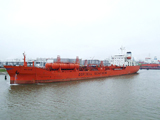Two European-owned tankers have been hijacked off the Somali coast, prompting an alert for other vessels to watch for a pick-up in pirate activity, the EU’s anti-piracy naval mission said on Thursday.
The Maritime Security Center run by the EU naval force said the 9,000-tonne Greek-owned, Panamanian-flagged MV Nipayia was seized on Wednesday with its crew of 19.
A Greek merchant marine ministry spokesman said the chemical tanker’s Russian captain and 18 Filipino crew members were in good health and that the boat’s owner, Lotus Shipping, had begun negotiations with the pirates.

PHOTO: EPA
The incident was followed early on Thursday with the capture of the 23,000-tonne Norwegian-owned and Bahamian-registered MV Bow-Asir with an unspecified number of crew.
Salhus Shipping, which owns the tanker, said in a statement from Norway that the crew numbered 27 members of different nationalities and that they had contacted the company after 16 to 18 pirates came aboard with automatic weapons.
“We have no reports of any injuries,” company director Per Hansen said. “We are doing our utmost to ensure the safety of the crew and have established communication lines with naval forces, insurance companies, flag state and charterer.”
Meanwhile, authorities in the Seychelles said three sailors from the Indian Ocean archipelago had been held hostage by Somali pirates since their catamaran was hijacked late lat month.
“Contact has been established with the kidnappers and discussions to secure the release of the hostages are ongoing. The objective of the negotiating team is for the safe return of all three hostages,” Ernest Quatre, Seychelles police chief, said in a statement.
Ransom-hunting Somali pirates attacked more than 130 merchant ships in the region last year, an increase of more than 200 percent on 2007, the International Maritime Bureau said.
The number and success rate of pirate attacks has declined slightly since the start of the year because of unfavourable sea conditions and an increased foreign naval presence in the Gulf of Aden.
Greece, which is home to the biggest commercial fleet in the world, called on the EU “to play a more active role” in cracking down on piracy after the latest two boats were captured.
Merchant Marine Minister Anastasis Papaligouras said the EU should “expand the rules of engagement and the area patrolled by the European naval force.”
He also called on companies “to inform with total accuracy and in good time the competent services” about the movements of boats.
“The pirates are not the only ones with weapons, the international community and Greece have them as well,” Papaligouras said.
In order to “to protect the present and future of our shipping” all means of intervention would be exhausted,” he said.
The rules of engagement of the European Atlanta flotilla charged with protecting shipping off Somalia meant it could use “all means including force.”

POLITICAL PRISONERS VS DEPORTEES: Venezuela’s prosecutor’s office slammed the call by El Salvador’s leader, accusing him of crimes against humanity Salvadoran President Nayib Bukele on Sunday proposed carrying out a prisoner swap with Venezuela, suggesting he would exchange Venezuelan deportees from the US his government has kept imprisoned for what he called “political prisoners” in Venezuela. In a post on X, directed at Venezuelan President Nicolas Maduro, Bukele listed off a number of family members of high-level opposition figures in Venezuela, journalists and activists detained during the South American government’s electoral crackdown last year. “The only reason they are imprisoned is for having opposed you and your electoral fraud,” he wrote to Maduro. “However, I want to propose a humanitarian agreement that

ECONOMIC WORRIES: The ruling PAP faces voters amid concerns that the city-state faces the possibility of a recession and job losses amid Washington’s tariffs Singapore yesterday finalized contestants for its general election on Saturday next week, with the ruling People’s Action Party (PAP) fielding 32 new candidates in the biggest refresh of the party that has ruled the city-state since independence in 1965. The move follows a pledge by Singaporean Prime Minister Lawrence Wong (黃循財), who took office last year and assumed the PAP leadership, to “bring in new blood, new ideas and new energy” to steer the country of 6 million people. His latest shake-up beats that of predecessors Lee Hsien Loong (李顯龍) and Goh Chok Tong (吳作棟), who replaced 24 and 11 politicians respectively

Young women standing idly around a park in Tokyo’s west suggest that a giant statue of Godzilla is not the only attraction for a record number of foreign tourists. Their faces lit by the cold glow of their phones, the women lining Okubo Park are evidence that sex tourism has developed as a dark flipside to the bustling Kabukicho nightlife district. Increasing numbers of foreign men are flocking to the area after seeing videos on social media. One of the women said that the area near Kabukicho, where Godzilla rumbles and belches smoke atop a cinema, has become a “real

‘WATER WARFARE’: A Pakistani official called India’s suspension of a 65-year-old treaty on the sharing of waters from the Indus River ‘a cowardly, illegal move’ Pakistan yesterday canceled visas for Indian nationals, closed its airspace for all Indian-owned or operated airlines, and suspended all trade with India, including to and from any third country. The retaliatory measures follow India’s decision to suspend visas for Pakistani nationals in the aftermath of a deadly attack by shooters in Kashmir that killed 26 people, mostly tourists. The rare attack on civilians shocked and outraged India and prompted calls for action against their country’s archenemy, Pakistan. New Delhi did not publicly produce evidence connecting the attack to its neighbor, but said it had “cross-border” links to Pakistan. Pakistan denied any connection to